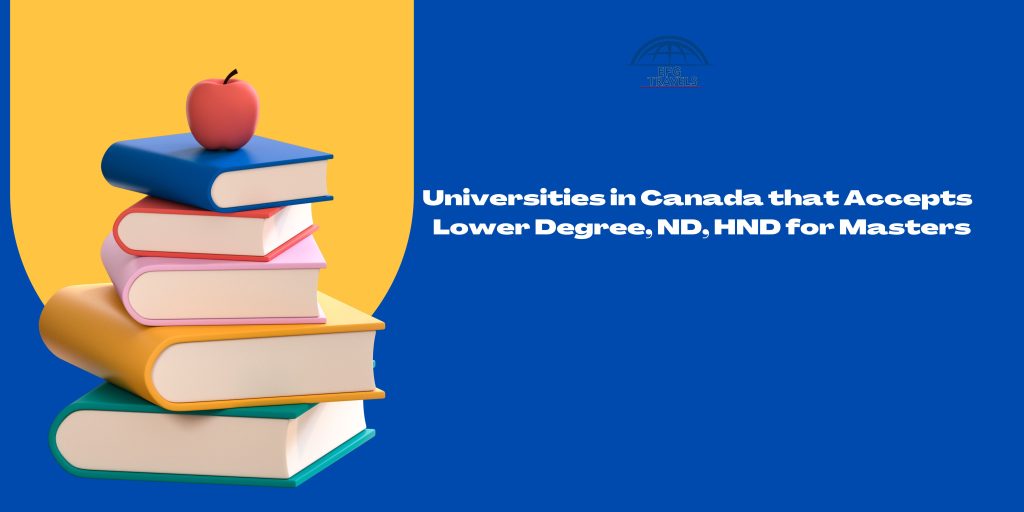
Universities in Canada that Accepts Lower Degrees, ND, and HND for Masters’ Programs: If you want to pursue a graduate (Masters) degree in Canada but your undergraduate grade was below average (second-class lower or third-class), this article is for you. If you also have an ND or HND, we got you covered for a postgraduate program in Canada.
People who have heard that Canadian schools do not accept HNDs or grades of 2:2 on their CGPA sometimes ask me questions about their chances of getting into one of those schools.
First and foremost, you should be aware that getting accepted into graduate programs in Canada (Master’s or Ph.D.) is a challenging, time-consuming, and painstaking process. The typical necessary passing grade is between 70 and 75 percent cumulatively. On a scale from 0 to 10, this corresponds to around a 3.5 CGPA. Also, successful applicants and those who get admission funds usually have grades that are higher than this minimum requirement and are going for a research-based degree, especially a Ph.D.
Some reasons for this:
* Canada is home to over one hundred different universities.
*There are certain universities that do not offer graduate or doctoral degrees.
*Your own course or program is not offered by all master’s and doctoral-granting universities.
*Those who provide your program will have a predetermined number of students they must accept.
In addition, there are more students who apply than there are spots available.
HNDs are often not recognized for further education at the masters or doctoral level in Canadian universities. You will discover that the typical entry criteria for a Master’s Degree is a good Bachelor of Science degree that was earned after four years of study. In addition to the grade you received for your Bachelor of Science overall, certain universities will also focus on the grade you received for the final two years of your Bachelor of Science degree.
If you have a low B.Sc. or an ND or HND grade, however, let me tell you about some things you may do to beat the odds and still study in Canada for a postgraduate program.
Certificate Program or Postgraduate Diploma:
If you have an ND, HND, or a 2:2 CGPA or a lower B.Sc grade, your best choice is to look for a Graduate Certificate (GC) or a similar program. This will allow you to come to Canada to study with less of a challenge than other academic credentials. This may also be referred to as a Postgraduate Diploma (PGD) or a Post Baccalaureate Diploma at various educational institutions.
Graduate Certificate programs are excellent options for people who struggled academically in their undergraduate studies or who have ND or HND degrees. The programs qualify for a postgraduate work permit, sometimes known as a PGWP, as well as additional privileges that are available to overseas students in general.
You are permitted to bring your family members with you to Canada if you are enrolling in a postgraduate diploma or certificate program.
You have the option to take the more challenging path toward earning a master’s degree or doctoral degree. It might be quite challenging but it’s up to you to make a decision on that pathway.
In the past, there have been applicants who have toed the path to studying for Masters/Doctoral programs directly with their low-grade degree certificates. But if I’m being totally honest with you, they typically have more than just grades to hide. I will summarize some of the things they did to make up for the low grade and put themselves in a position to benefit from the chance.
Some Suggestive Actions:
1. Develop a resume that highlights your research and publications (and do your best to get a Supervisor for a research-based Master’s program)
2. Acquire some relevant work experience to demonstrate that you have the necessary level of professional experience.
3. Send your resume to institutions with lower rankings.
4. Take and succeed at standardized tests (such as the GMAT or GRE, if necessary for the program of study that interests you).
4. Do your best to prepare the other documents, such as Curriculum Vitae (CV), Statement of Purpose (SoP), and, Reference Letters.

List of Universities that Accept Low Grades, HND, and ND Certificates:
In addition, the following list of Canadian universities has a history of being sympathetic enough to admit students with poor marks to their master’s degree programs:
The University of Royal Roads
University of the Bishops
Saint Mary’s University
University of Canada West
Regina University
Mount Saint Vincent University
Memorial University
The University of Thompson Rivers
The University of Crandall
University of the Province of Prince Edward
The University of the Canadian Mennonites
The University of Brandon
And as was said previously, the majority of students who were granted admission brought more to the table than just poor marks when they met with admissions officers. So, you should look into some of these schools, find out what you need to do to get in, improve your profile, and see what else you can do to improve your chances. Excel & Fortune Global Services can be of assistance to you to save you time with other things that matter.
Also Read: How to get a Canadian student (study permit) visa
Last but not least, Graduate Certificate programs are not open to students who only hold an ND or HND, or who have a low BSc grade point average. These are also programs that are very applicable and provide instruction via hands-on experience. Because of this, even students who have a 2:1 (also known as a second class upper) or a first class in their CGPAS can pursue them if they aren’t interested in pursuing a master’s degree.
The vast majority of postgraduate certificate programs can be found in Canadian colleges also In addition, certain universities in Canada provide these programs, sometimes in the form of postgraduate diplomas. You are able to conduct a search for colleges in Ontario right here. In addition, Google lets you search for colleges located in other Canadian provinces.
The length of the programs varies from one year to two years, both in terms of the specific program that one participates in and the educational institution that makes it available.
Also, new information from the Canadian government shows that more and more college students from other countries are coming to this country to study.
One final and very significant point to consider!
Interestingly, as a foreign student, you are strongly encouraged to submit an application to a Designated Learning Institution (DLI) that has been granted approval, as well as to an institution that will make you qualified for a Post-graduation work permit if you intend to remain in Canada after completing your studies and find employment there.
To apply for a study permit (Visa), you must have a Letter of Acceptance (LOA) from a school that is known to be legitimate and with a Designated Learning Institution (DLI) number. A DLI is a school that has been granted permission by a provincial or territorial government of Canada to accommodate students from other countries. Such DLI schools have identifiable numbers to check the veracity of claims from the relevant Canadian government website
More Read
You can use this site to determine whether or not a particular school is a designated learning institution and whether or not the programs it offers qualify for a post-graduation work visa.
I really do hope that this post is helpful to you in some way, and I want to wish you the best of luck with your application!






Leave a Review